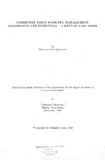| dc.description.abstract | This thesis evaluates the suitability of a Community-Based Resource Management
(CBRM) strategy to resolve the resource use conflicts in Tana Delta, Kenya and
proposes a model of CBRM which would protect the environment. The model proposed
is one that empowers the local communities through localized resource control and broad
based participation in decision making processes. It also defines a role for the state in
providing both statutory and material support for reinforcing local capacities.
The thesis is based on a case study on resource use conflicts emanating from the
establishment of a wetland reserve in Tana Delta, Kenya. The Study is based on six
weeks of research conducted in the Tana Delta in Tana River District, Kenya.
Qualitative methods using the techniques of rapid rural appraisal were used to conduct
the field work.
Four major sources of conflicts at different levels are identified: local class struggles
between state created elites and non-elites, asymmetrical power relations between the
state and the local communities, inappropriate and contradictory state policies, and
finally the international politico-economic framework in which western conservation
principles are imposed on developing nations through international aid and international
environmental law.
Implementation of the wetland project will exacerbate existing pressures on the local
communities and threaten their livelihoods. The reserve will alienate the people from
their local resources including agricultural fields, grazing lands, forests and fishing
grounds.' On the other hand, the wetland reserve serves national interests as well as an
international conservation agenda. In the final analysis, this thesis identifies serious
impediments to the implementation of a CBRM strategy in the Tana Delta. However,
there are overwhelming advantages in using a CBRM strategy, and therefore it is argued
that a CBRM strategy will resolve the conflicts in a way that protects the local resources
and meets the subsistence needs of the indigenous communities. | en |

